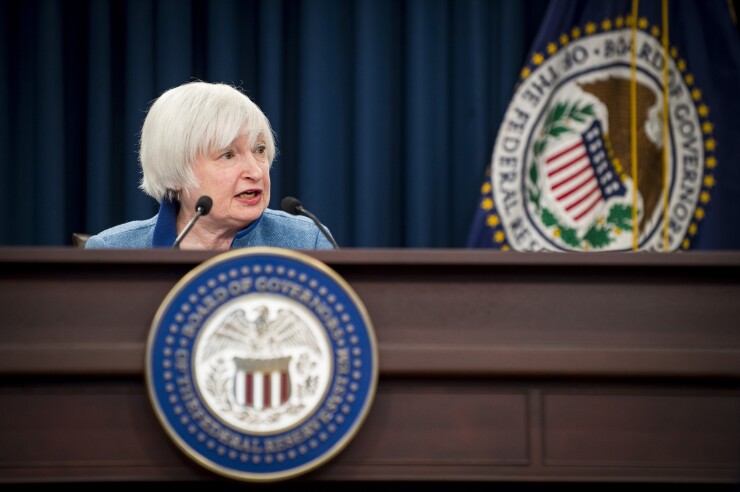Most Federal Reserve officials said they backed a policy change that would begin shrinking the central bank's $4.5 trillion balance sheet later this year, as they reiterated their outlook for gradual interest-rate increases.
"Most participants anticipated that gradual increases in the federal funds rate would continue and judged that a change to the committee's reinvestment policy would likely be appropriate later this year," according to minutes of the Federal Open Market Committee's March 14-15 meeting released Wednesday in Washington.
"Many participants emphasized that reducing the size of the balance sheet should be conducted in a passive and predictable manner," the minutes showed.
The record provides an outline of the discussion U.S. central bankers held before approving a quarter-point increase in their benchmark lending rate.
The minutes hew closely to Chair Janet Yellen's account of the monetary-policy discussion laid out at her news conference after the rate-hike announcement. Yellen emphasized at the time the hike in rates didn't reflect a "reassessment of the economic outlook or of the appropriate course for monetary policy."

In materials released with the FOMC statement, officials stuck to a median projection for three total rate increases in 2017.
The minutes showed nearly all of the officials judged the economy was at or near full employment, and nearly all voting members believed inflation was still short of the Fed's 2 percent target.
The committee was split over the risk that inflation might eventually move higher than desired. While some participants said recent gains in inflation "should not be overstated," others worried that inflation data this year were stronger than expected.
Unemployment stood at 4.7% in February, at or near most economists' estimates of its lowest sustainable level. The Fed's preferred measure of prices rose 2.1% in the 12 months through February, the first time it's topped the central bank's 2% target in almost five years.
As part of their discussion of the economy, many Fed officials observed a rise in equity prices in recent months as contributing to an easing in financial conditions.
"Some participants viewed equity prices as quite high relative to standard valuation measures," the minutes said. It was also observed that "prices of other risk assets, such as emerging market stocks, high-yield corporate bonds, and commercial real estate, had also risen significantly in recent months."
Regarding the balance sheet, "participants generally preferred to phase out or cease reinvestments of both Treasury securities" and agency mortgage-backed securities at the same time.
The committee also discussed phasing out versus simply ending reinvestments. A phase-out was seen as less likely to trigger volatility, but slower and more difficult to communicate to investors.
The committee made no decisions regarding the balance sheet and agreed to renew the discussion at subsequent meetings.
New York Fed President William Dudley indicated last week that the time to begin shrinking the central bank's balance sheet may be drawing near.
"It wouldn't surprise me if sometime later this year or sometime in 2018, should the economy perform in line with our expectations, that we'll start to gradually let securities mature rather than reinvesting them," Dudley said Friday in a Bloomberg Television interview.
"If we start to normalize the balance sheet, that's a substitute for short-term rate hikes," and "we might actually decide at the same time to take a little pause in terms of raising short-term interest rates," he added.
Three rounds of bond purchases from 2008 to 2014 aimed at pressing down long-term lending rates bloated the Fed's balance sheet from less than $1 trillion before the financial crisis.
The target range for the benchmark federal funds rate is 0.75% to 1%. The FOMC schedules eight meetings a year with the next set for May 2-3 in Washington.





